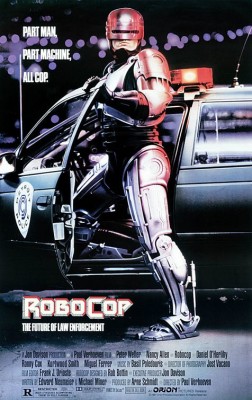
The other day I rewatched the movie RoboCop for the many-ith time in preparation for the RoboCop remake due in theaters February 12. To me, the original RoboCop is, was, and always will have that perfect match of future sci-fi that is just close enough to now that we can see our familiar world under veneer the new.
Most other times that I’ve watched RoboCop I’ve seen it mostly as a sci-fi action film that’s more than just robots and guns and explosions. This time I saw it for what it really was; a horror film with a few sci fi and action elements thrown in.
RoboCop is really a riff on the Frankenstein story with officer Alex J. Murphy (Peter Weller) as the stand-in for the green lunk in the lead role. In RoboCop, it’s a near-future Detroit where crime is rampant and gigantic multinational corporations have started taking over things like the military and police departments. The OCP corporation wants to build a new city from the ruins of “old Detroit” and want new RoboCop police corps to patrol this new city.
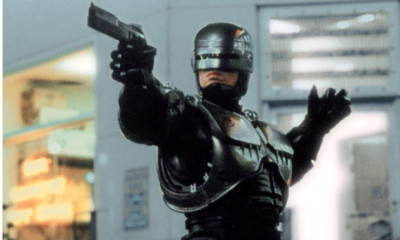
When Murphy is shot to death by a gang of criminals, OCP takes his body and uses it for the prototype of their new RobCop army. Murphy returns as a walking computerized super-police officer who’s only mission is to destroy crime — and be obedient to OCP too.
Where the Frankenstein monster was a creature of limited intelligence, RoboCop is the opposite. Via servers and databanks he has almost unlimited intelligence, constantly records everything he sees and hears and can recall any detail from his life. Where both RoboCop and Frankenstein are similar, though, is that each start out with incomplete memories of their past that they slowly regain over time. With Murphy it’s memories of his murder and his lost family.
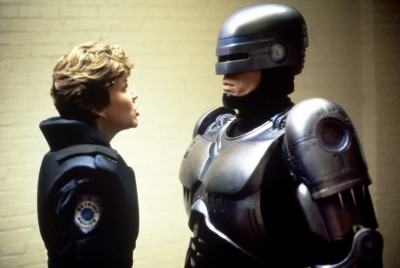
If RoboCop is a kind of Frankenstein’s monster, then his creator Bob Morton (Miguel Ferrer) must be his Dr. Frankenstein. Dr. Frankenstein wanted to be the creator of life no matter what the consequences and Morton wants to create RoboCop because of the power the program will bring him within OCP — no matter the consequences to Detroit or Murphy and his family as well.
There’s also the gore factor in RoboCop that drives that film more towards horror than simply sci-fi too. The squeamish should look away now.
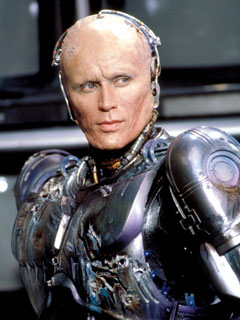
In RoboCop, when Murphy is shot to death by the criminals one of his arms is blown off and gushes blood. Another time an OCP executive gets on the wrong side of another robot gone rogue and is shot to death and nearly torn in half. And towards the end of the movie one of the criminals who originally shot and killed Murphy (a pre-ER “Rocket” Romano Paul McCrane) gets his comeuppance by trying to run-down RoboCop, missing and crashing his car into a vat of toxic waste and emerges as some weird melting-man monster-thing. Which is bad enough, until he’s hit by another car and explodes into a gush of orange comic book goo.
And that’s just the gore from the theatrical release version of the film. The unrated director’s cut version of the movie has much more blood and violence than what ended up in the final film. The MPAA reportedly called the first cut of RoboCop “excessively violent” meaning much of this was taken out of the film to secure its R-rating on initial release.
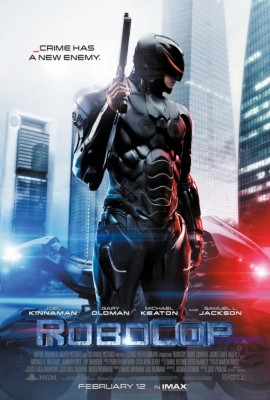
Now that I think about it, RoboCop isn’t the only late 1980s horror film masquerading as an action/sci-fi fare. There’s also Aliens (1986) which is essentially at take on a haunted house movie where the ghosts bite and Predator (1987) that’s practically a remake of The Most Dangerous Game (1932), right down to the ending where the person being hunted tricks the hunter into thinking he’s dead by leaping into a body of water and hiding out until he’s able to gain the upper hand.
Not counting this new remake there were three RoboCop movies, and a RoboCop live action and animated TV series too. While RoboCop 2 was interesting, none of the sequels of TV series that followed could ever match the greatness of the original.
The RoboCop remake opens February 12 just in time for Valentine’s Day. 😉